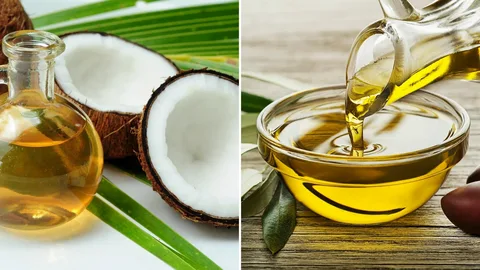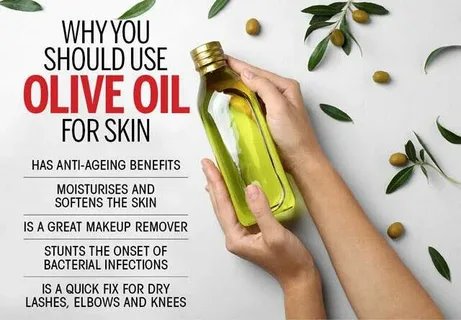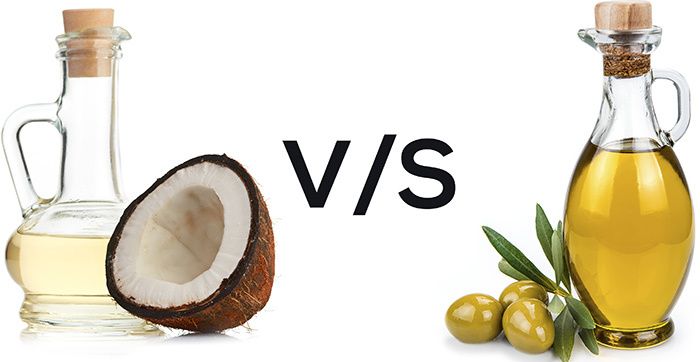Our skin is our body’s largest organ, so choosing the right oils (coconut oil or olive oil) to nourish it is crucial. Coconut oil and olive oil are two of the most popular natural skin care ingredients, but which one reigns supreme?
While both offer impressive skin benefits, the superiority of one over the other ultimately depends on your individual skin type and needs.
This comprehensive guide will break down the key differences between coconut oil and olive oil to help you determine which oil is the better choice for your skin.
We’ll explore the unique properties and benefits of each oil, as well as their potential downsides. By the end, you’ll have a clear understanding of which natural skin care wonder is best suited to transform your complexion.
The Skin Benefits of Coconut Oil
Coconut oil has long been revered for its impressive array of skin nourishing properties. This deeply moisturizing oil is rich in fatty acids like lauric acid, capric acid, and caprylic acid, which work to deeply hydrate and soften the skin.
Coconut oil also contains antimicrobial, antibacterial, and antifungal compounds that can help combat common skin issues like acne, eczema, and fungal infections.
Key Benefits of Coconut Oil for Skin:
- Intense Hydration: The fatty acids in coconut oil penetrate deep into the skin’s layers to provide long lasting moisture and prevent dryness.
- Improved Skin Elasticity: Coconut oil may help improve skin elasticity and reduce the appearance of fine lines and wrinkles.
- Reduced Inflammation: The antimicrobial and anti inflammatory properties of coconut oil can help soothe redness, irritation, and inflammation.
- Enhanced Skin Barrier: Coconut oil reinforces the skin’s natural protective barrier to lock in moisture and ward off environmental stressors.
Who Benefits Most from Coconut Oil?
Coconut oil is an excellent choice for those with dry, flaky, or dehydrated skin types. It can be particularly helpful for managing chronic skin conditions like eczema, psoriasis, and even acne.
The rich, emollient texture of coconut oil deeply nourishes parched skin, leaving it soft, supple, and radiant. However, it’s important to note that coconut oil has a comedogenic rating of 4, meaning it has a higher likelihood of clogging pores.
As a result, those with naturally oily or acne prone skin may want to exercise caution when using coconut oil, as it could potentially exacerbate breakouts.
The Skin Benefits of Olive Oil
While coconut oil is revered for its skin nourishing properties, olive oil is also a powerhouse when it comes to promoting healthy, glowing skin. Rich in antioxidants like vitamin E, olive oil works to combat free radical damage and signs of premature aging.
The monounsaturated fatty acids in olive oil, such as oleic acid, also help strengthen the skin’s natural barrier to lock in moisture.
Key Benefits of Olive Oil for Skin:
- Antioxidant Protection: The high concentration of vitamin E and other antioxidants in olive oil helps shield the skin from environmental stressors that can cause premature aging.
- Enhanced Skin Barrier: Olive oil’s oleic acid content reinforces the skin’s protective outer layer to prevent moisture loss.
- Improved Skin Elasticity: The nourishing fatty acids in olive oil may help improve skin elasticity and reduce the appearance of fine lines and wrinkles.
- Soothing Inflammation: Olive oil’s anti inflammatory properties can help calm redness, irritation, and skin conditions like eczema.
Who Benefits Most from Olive Oil?
Unlike coconut oil, olive oil is suitable for a wide range of skin types, including oily and acne prone complexions.
Its lighter, less greasy texture makes it an excellent choice for those who want the hydrating and nourishing benefits of an oil without feeling weighed down or clogged.
Olive oil is particularly beneficial for mature or sun damaged skin, as its antioxidant rich composition can help counteract the visible signs of aging.
That said, the richer, heavier texture of olive oil may not be ideal for those with naturally oily or acne prone skin.
In these cases, the oil may take longer to fully absorb into the skin, potentially leading to a shiny, greasy appearance. Those with these skin types may want to opt for a lighter, more quickly absorbing oil like coconut.
Comparing Coconut Oil Or Olive Oil
Now that we’ve explored the individual benefits of coconut oil and olive oil, let’s take a closer look at the key differences between the two:
Composition and Properties:
- Coconut Oil: Highly saturated fat with a solid, dense texture at room temperature. Contains antimicrobial, antibacterial, and antifungal properties.
- Olive Oil: Monounsaturated fat with a more liquid, lightweight texture. Rich in skin nourishing antioxidants like vitamin E.
Performance for Specific Skin Concerns:
- Dry Skin: Coconut oil may provide more intense, long lasting hydration due to its occlusive properties.
- Acne Prone Skin: Olive oil is less comedogenic (pore clogging) than coconut oil, making it a safer choice for those prone to breakouts.
- Anti Aging: Both oils offer benefits for reducing the visible signs of aging, but the antioxidant power of olive oil may give it a slight edge.
Absorption and Texture:
- Coconut Oil: Absorbs relatively quickly into the skin, leaving a soft, non greasy finish.
- Olive Oil: Takes longer to fully absorb, resulting in a heavier, greasier texture on the skin.
Ultimately, the “better” oil for your skin will depend on your unique complexion and needs. Those with dry, dehydrated skin may find that coconut oil provides more intense, long lasting moisture.
Meanwhile, those with oily or acne prone skin may prefer the lighter, less comedogenic properties of olive oil.
It’s also important to note that some individuals may have sensitivities or allergies to one oil or the other.
As with any new skin care product, it’s always a good idea to do a small patch test before incorporating coconut or olive oil into your routine.
Choosing the Right Oil for Your Skin
So, how do you determine which natural oil is the better choice for your skin? Here are a few key factors to consider:
Skin Type:
- Dry/Dehydrated Skin: Coconut oil’s intense moisturizing properties make it an excellent choice.
- Oily/Acne Prone Skin: Olive oil’s lighter, less comedogenic texture may be the better option.
- Normal to Combination Skin: Either oil can work well, depending on your specific needs.
Skin Concerns:
- Eczema, Psoriasis, Fungal Infections: Coconut oil’s antimicrobial benefits make it a top contender.
- Premature Aging, Sun Damage: Olive oil’s antioxidant rich composition can help combat visible signs of aging.
- Redness, Inflammation: Both oils offer soothing, anti inflammatory properties.
Personal Preference:
- Texture and Absorption: Do you prefer a heavier, greasier feel or a lighter, quickly absorbing oil?
- Scent: Coconut oil has a distinct tropical aroma, while olive oil has a more subtle, earthy scent.
- Ethical/Sustainability Concerns: Consider the sourcing and production methods of each oil.
Ultimately, the “best” oil for your skin is the one that leaves your complexion looking and feeling its absolute healthiest.
Don’t be afraid to experiment with both coconut and olive oil to see which one provides the most transformative results for your unique skin type and needs.
Conclusion
When it comes to natural skin care, coconut oil and olive oil are both worthy contenders. While each oil offers impressive benefits for the skin, the “winner” ultimately depends on your individual complexion and preferences.
Coconut oil excels at providing deep, long lasting hydration, while also boasting antimicrobial and anti inflammatory properties that can help manage chronic skin conditions.
On the other hand, olive oil’s antioxidant rich composition makes it a superstar for combating the visible signs of aging and reinforcing the skin’s natural protective barrier.
At the end of the day, the key is to listen to your skin and be willing to experiment to find the oil that leaves your complexion looking and feeling its absolute best.
Whether you choose coconut, olive, or even a combination of the two, incorporating these nourishing natural oils into your skin care routine is a surefire way to achieve a radiant, glowing complexion.
FAQs
Is coconut oil or olive oil better for acne prone skin? Olive oil may be the better choice for acne prone skin, as it has a lower comedogenic rating and is less likely to clog pores. Coconut oil, on the other hand, has a higher likelihood of contributing to breakouts.
Can I use coconut oil and olive oil together on my skin? Absolutely! Using a combination of coconut oil and olive oil can provide a powerful one two punch of hydration, nourishment, and skin smoothing benefits. Just be mindful of your skin type and adjust the ratios accordingly.
Is coconut oil or olive oil better for anti aging? Both oils offer benefits for reducing the visible signs of aging, but olive oil may have a slight edge due to its higher antioxidant content.
The vitamin E in olive oil can help combat free radical damage and improve skin elasticity.
How do I choose between coconut oil and olive oil for dry skin? For exceptionally dry, dehydrated skin, coconut oil’s deeply moisturizing properties may make it the better choice.
However, those with very dry skin can also benefit from the nourishing effects of olive oil, especially if they find coconut oil to be too heavy or occlusive.
Can I use coconut oil or olive oil as a makeup remover? Yes! Both coconut oil and olive oil make excellent natural makeup removers. Their emollient textures effectively dissolve and lift away even waterproof makeup, leaving the skin soft and clean.




